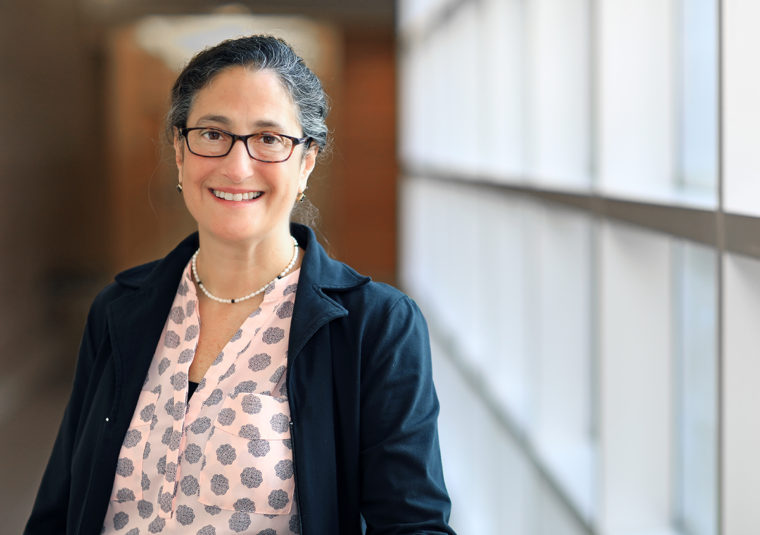Robyn S. Klein, MD, PhD, a physician-scientist recognized internationally for her work on the brain’s immune system, has been named vice provost and associate dean for graduate education for the Division of Biology & Biomedical Sciences (DBBS) at Washington University in St. Louis. She will begin her new post Jan. 1.
“The Division of Biology & Biomedical Sciences is an integral part of the university’s collaborative research and education enterprise,” said Provost Holden Thorp. “We are exceptionally fortunate to have such an accomplished scientist and leader as Robyn Klein to step into the role of vice provost and associate dean. Under her direction, the division will undoubtedly further its success in bringing together faculty and graduate students across disciplines to seek solutions to today’s most critical challenges in biomedical research. I look forward to working with her in her new role.”
Klein succeeds John H. Russell, who is retiring but will retain an appointment in developmental biology. He plans to focus on revitalizing the Office of Postdoctoral Affairs.
Widely emulated for its interdisciplinary and collaborative approach to training PhD scientists, DBBS crosses both the Danforth and Medical campuses. It brings together about 525 faculty members from 37 departments in the School of Medicine, Arts & Sciences, and the School of Engineering & Applied Science who teach and mentor some 500 graduate students, making it the largest PhD program at the university.
As associate dean, Klein will set the direction of graduate education at DBBS. She also will be the first associate dean of graduate education to hold the title of vice provost, a change in governance that recognizes the status of DBBS as a universitywide academic endeavor. Klein intends to build on the division’s strength in training young scientists, and to prepare students for scientific careers that are interdisciplinary and extend beyond academic domains.
“We have a fantastic graduate program, and our faculty provide first-rate scientific training,” said Klein, a professor of medicine, of neuroscience, and of pathology and immunology. “We have to provide the best training and experience for our graduate students so they will be prepared for top positions, whether they go into academia, industry, science policy, scientific publishing or any other field.”
The national search for a DBBS leader came after an extensive review of the program, led by Thorp, Barbara A. Schaal, dean of the faculty of Arts & Sciences, and the current and former deans of the School of Medicine, David H. Perlmutter, MD, and Larry J. Shapiro, MD, respectively. Additionally, internal and external experts worked together in a multistage process to make a set of recommendations aimed at ensuring that DBBS remains a leader in the field of graduate training in the basic sciences. Based on the review and recommendations for moving DBBS forward, the university has updated the leadership structure of the program.
As part of her responsibilities, Klein will evaluate new programs and educational approaches and experiences to keep DBBS at the forefront of graduate education. Such enhancements will be aimed at preserving and strengthening the legacy created when Chancellor Emeritus William H. Danforth, MD, and P. Roy Vagelos, MD, former head of the Department of Biological Chemistry, founded DBBS in 1973. Their pioneering vision — a program in which cross-departmental intellectual pollination would benefit students and mentors while promoting innovation and cutting-edge research — continues to guide DBBS today.
DBBS has an important role in promoting diversity and inclusion at Washington University, and Klein plans to lead new efforts in this area, among students, faculty and staff. She believes increased diversity will enhance the quality of education and research at the university. She plans to focus on new ways to increase recruitment of students from underrepresented minority groups.
“There are a lot of excellent underrepresented minority students who do not necessarily consider our program when they are looking at graduate training,” Klein said. “I am looking for ways to identify such students and encourage them to come to St. Louis.”
Klein, who joined the faculty in 2003, is the founding director of the university’s Center for Neuroimmunology and Neuroinfectious Diseases. Much of her work has focused on how the barrier between the brain and the rest of the body changes when the brain is infected or inflamed and, more recently, on how infections alter cognitive function. Her past studies have shed light on why women are much more likely than men to develop multiple sclerosis, and how viral infections such as West Nile and Zika damage the brain.
Klein is an elected member of the International Advisory Board of the International Society of Neuroimmunology and a recipient of the Dana Foundation Award for Neuroimmunology. She is a founding member of the International Society for Neurovirology and a member of the American College of Physicians, the American Society for Microbiology, the American Society for Immunology and the International Society for Neuroimmunology.
She is also president of the Academic Women’s Network at the School of Medicine. In that role, she promotes career development and mentorship for women in science and medicine.
After earning a bachelor’s degree in biology at Barnard College in 1985, Klein earned a master’s degree in neuroscience in 1990 and a doctorate in neuroscience and a medical degree in 1993 from the Albert Einstein College of Medicine. She completed her internship and residency at Brigham & Women’s Hospital in Boston, followed by a fellowship in infectious diseases at Massachusetts General Hospital and a fellowship in immunology at Harvard Medical School.
